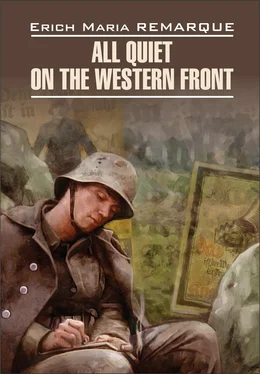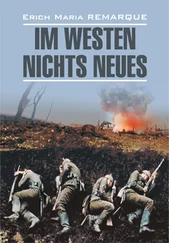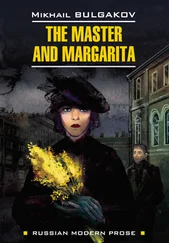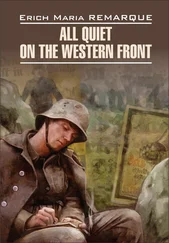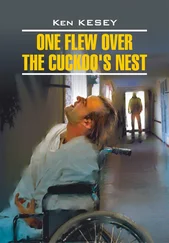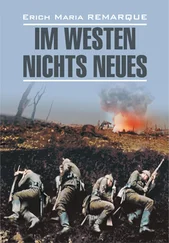My state of mind is getting worse all the time, and I can’t control my thoughts. What does his wife look like? Like the slim dark girl in the house by the canal? Doesn’t she belong to me? Perhaps she belongs to me now because of all this! If only Kantorek were sitting here by me! What if my mother saw me in this state – The dead man would surely have been able to live for another thirty years if I’d taken more care about how I was going to get back. If only he had been running a couple of yards further to the left he’d be back in his trench over there writing another letter to his wife.
But this will get me nowhere, it’s the fate we all share. If Kemmerich’s leg had been a few inches further to the right, if Haie had leaned an inch or two further forward —
The silence spreads. I talk, I have to talk. So I talk to him and tell him directly, ‘I didn’t mean to kill you, mate. If you were to jump in here again, I wouldn’t do it, not so long as you were sensible too. But earlier on you were just an idea to me, a concept in my mind that called up an automatic response – it was that concept that I stabbed. It is only now that I can see that you are a human being like me. I just thought about your hand-grenades, your bayonet and your weapons – now I can see your wife, and your face, and what we have in common. Forgive me, camarade. We always realize too late. Why don’t they keep on reminding us that you are all miserable wretches just like us, that your mothers worry themselves just as much as ours and that we’re all just as scared of death, and that we die the same way and feel the same pain. Forgive me, camarade, how could you be my enemy? If we threw these uniforms and weapons away you could be just as much my brother as Kat and Albert. Take twenty years from my life, camarade, and get up again – take more, because I don’t know what I am going to do with the years I’ve got.’
He is silent, the front is quiet apart from the chatter of machine-guns. The bullets are close together and this is not just random firing – there is careful aiming from both sides. I can’t get out.
‘I’ll write to your wife,’ I tell the dead man breathlessly, ‘I’ll write to her, she ought to hear about it from me, I’ll tell her everything that I’m telling you. I don’t want her to suffer, I want to help her, and your parents too and your child —’
His uniform is still half open. It is easy to find his wallet. But I am reluctant to open it. Inside it will be his pay book with his name. As long as I don’t know his name it’s still possible that I might forget him, that time will wipe out the image of all this. But his name is a nail that will be hammered into me and that can never be drawn out again. It will always have the power to bring everything back, it will return constantly and will rise up in front of me.
I hold the wallet, unable to make up my mind. It slips out of my hand and falls open. A few pictures and letters drop out. I collect them up and go to put them back in, but the pressure that I am under, the complete uncertainty of it ah, the hunger, the danger, the hours spent with the dead man, these things have all made me desperate, and I want to find out as quickly as possible, to intensify the pain so as to end it, just as you might smash an unbearably painful hand against a tree, regardless of the result.
There are photographs of a woman and of a little girl, small amateur snapshots, taken in front of an ivy-covered wall. There are letters with them. I take them out and try to read them. I can’t understand most of them, since they are difficult to decipher and I don’t know much French. But every word I translate hits me like a bullet in the chest – or like a dagger in the chest —
My head is nearly bursting, but I am still able to grasp the fact that I can never write to these people, as I thought I would earlier on. Impossible. I look at the photos again; these are not rich people. I could send them money anonymously, if I start earning later. I cling to this idea, it is at least a straw to grasp at. This dead man is bound up with my life, and therefore I have to do everything for him and promise him everything so that I can be rescued. I swear wildly that I will devote my whole existence to him and to his family. I assure him of this with wet bps, and deep within me, while I am doing so, there is the hope that I can buy my own salvation that way, and maybe get out of this alive – it’s a little trick of the mind, because what you promise are always things that you could only see to afterwards. And so I open the pay book and read slowly: Gerard Duval, compositor.
I write down the address on an envelope with the dead man’s pencil, and then in a great hurry I shove everything back into his tunic again.
I have killed Gerard Duval, the printer. I think wildly that I shall have to become a printer, become a printer, a printer —
By the afternoon I am calmer. All my fears were groundless. The name no longer bothers me. The attack has passed. ‘Well, pal,’ I call across to the dead man, but now I say it calmly, ‘Your turn today, mine tomorrow. But if I get out of all this, pal, I’ll fight against the things that wrecked it for both of us: your life, and my —? Yes, my life too. I promise you, pal. It must never happen again.’
The sun’s rays are slanting. I am numb with exhaustion and hunger. Yesterday seems nebulous to me. I no longer have any hopes of getting out of here. So I doze fitfully, and don’t even realize that it is evening again. Twilight. It seems to come quickly now. Another hour. If it were summer, another three hours. Another hour.
Now I suddenly start to tremble in case anything goes wrong. I am not thinking about the dead man any more, he’s of no importance to me. All at once my desire for life comes back and everything that I promised before gives way in the face of that desire. But just so as not to attract bad luck at this stage I babble mechanically, ‘I’ll do everything, everything that I promised you’ – but I know already that I won’t.
It suddenly occurs to me that my own mates might shoot at me if I crawl their way: they don’t know it’s me. I’ll shout out at the first possible point where they might understand me. Then I’ll wait there, I’ll lie in front of the trench until they answer.
The first star. The front is still quiet. I breathe out and talk to myself in my excitement: ‘Don’t do anything stupid now, Paul – keep calm, Paul, calm – then you’ll be OK, Paul.’ It’s a good move for me to say my own name, because it sounds as if someone else were doing it, and is that much more effective.
The darkness deepens. My agitation subsides and to be on the safe side I wait until the first light-rockets go up. Then I crawl out of the shell hole. I have forgotten the dead man. In front of me is the young night and the battlefield bathed in pale light. I pick out a shell hole; the moment the light dies away I rush across, feel my way onwards, get to the next one, take cover, hurry on.
I get nearer. Then by the light of one of the rockets I see something in the barbed-wire that moves for a moment before it stops, so I lie still. The next time, I spot it again, it must be men from our trench. But I’m still cautious until I recognize our helmets. Then I shout.
My own name echoes back to me straight away as an answer: ‘Paul – Paul.’
I shout again. It is Kat and Albert, who have come out with a tarpaulin to look for me.
‘Are you wounded?’
‘No, no —’
We tumble into the trench. I ask for something to eat and gobble it down. Muller gives me a cigarette. I give a brief account of what happened. After all, it is nothing new; that sort of thing has happened plenty of times. The only difference in the whole thing was the night attack. But once in Russia Kat had to lie up for two days behind the Russian lines before he could break through.
Читать дальше
Конец ознакомительного отрывка
Купить книгу
